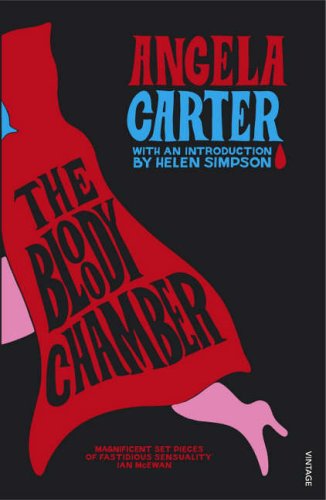Full disclosure, folks. You know how I’ve been upfront with you all about my love of Woolf? Well, my love of her is only really rivaled by my love of Angela Carter. British feminist writers know the keys to my heart, and truthfully Carter is one of the writers I discuss heavily in my thesis project. I just love her, and have found that she has been largely forgotten as time has worn on (she died in 1992). This is only a smidgen short of a tragedy, in my mind. Forget Twilight or any of those other fantastical, paranormal books being written nowadays–read some Carter and I promise you won’t regret it.
Published: 1979
Quick Read?: Carter’s language is very rich and detailed, but the stories themselves are engrossing. It’s a fairly quick read.
Difficulty: Again, Carter loves to use elaborate language. Some may find it intimidating, but her writing flows so well that it hardly feels difficult to read most of the time.
Synopsis: The Bloody Chamber is a collection of short stories, or rather, “revisions” of classic fairy tales. Carter revisits, revises, or perhaps rewrites well known Western fairy tales and myths, making them more violent, more risqué, and if nothing else, more three-dimensional. Carter’s feminist twists feel refreshing and modern, even if her audience has heard these tales ad nauseum throughout their lives. The infamous title story “The Bloody Chamber” tells the familiar story of “Bluebeard” from the young wife’s perspective, giving voice to her thoughts and agency to her (and her mother, interestingly) as she faces certain death. “The Courtship of Mr. Lyon” and “Tiger’s Bride” both tell the tale of “Beauty and the Beast” but from vastly different points of view: one that the romance is one of mutual respect and reconciliation with the beast within all humans, the other implying that all men are beasts, and all women are prone to be ravaged. All of her stories take on the troublesome power dynamics of women in classic fairy tales and myths, but go deeper than just giving them agency–they examine these women’s thoughts, their possible actions, and the possibility that perhaps all humans are far more animalistic then we might like to think.
What makes this book great?: This is hard for me to answer since I’m planning to write some 80-odd pages on the subject, but the easiest way to put it is that Carter does a wonderful job of creating a feminist work that is more than just political rhetoric. It examines women in society and how their position, if these old fairy tales are to be believed, is so fixed, yet these characters are also human and humans descends from animals. Society dictates these rules to make it seem as though we are above animals, when really, all of her characters are trying to tame their animalistic instincts constantly, usually to no avail. So it’s a book concerning gender, but not exclusively, and that is something I feel should be greatly admired.
On a more fun note, there is something very satisfying in reading fairy tales from childhood in a more adult way. The violent and sexual aspects are more prominent in Carter’s retelling, and more disturbing. It’s a great deal more fun, but also unsettling. It makes you re-examine how these tales shaped your youth and the way you once viewed the world. Yet, the touch of magic and surreal throughout still makes The Bloody Chamber a great place to escape to, albeit temporarily.
A few points of interest:

Read The Bloody Chamber then try and tell me you DON'T want to frolic through the woods with Angela Carter. Just try and tell me you don't. You'll want to frolic with her. Trust me on this.
- Carter was also a translator. She translated Charles Perrault’s fairy tales (he was the original Mother Goose–yes, Mother Goose was originally a guy), and this in turn inspired her to write The Bloody Chamber.
- She also wrote stories based on historical events that included women–a great one is “The Fall River Axe Murders” where Carter steps inside the mind of the famous murderer Lizzie Borden, creating a sympathetic portrait of a squandered woman.
- Carter also wrote her own screenplay for the short story “Company of Wolves” from The Bloody Chamber. Not something a lot of authors get to do. Check out the trailer, pretty creepy, right? However, it received mixed reviews upon release:
If you enjoy this, try: Burning Your Boats: The Collected Stories by Angela Carter; A Good Man is Hard to Find by Flannery O’Connor; Transformations by Anne Sexton; One Hundred Years of Solitude by Gabriel Garcia Marquez; St. Lucy’s Home for Girls Raised by Wolves by Karen Russell; Orlando by Virginia Woolf
